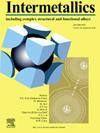通过第二相的优先腐蚀加速 Fe-30Mn-S 生物复合材料的生物降解
IF 4.3
2区 材料科学
Q2 CHEMISTRY, PHYSICAL
引用次数: 0
摘要
生物医用 Fe-30Mn 合金是修复承重骨缺损的一种很有前途的替代材料,但其应用在很大程度上受到降解速度慢于天然骨生长速度的限制。研究提出了 Fe-30Mn-S 生物复合材料中次相 MnS 的加速腐蚀机制。具体而言,腐蚀电位较低的 MnS 优先发生腐蚀,从而增加了腐蚀活性位点。此外,MnS 腐蚀产生的吸附 S 元素削弱了 Fe 的金属-金属键。同时,离子半径较小的 Cl- 很容易穿透降解产物,使腐蚀坑内的腐蚀介质更具侵蚀性。因此,Fe-30Mn-S 生物复合材料在腐蚀演化过程中有垂直膨胀的趋势,并造成快速腐蚀,腐蚀速率显著增加,达到 0.41 mm y-1。此外,Fe-30Mn-S 生物复合材料的极限抗压强度为 687 ± 22 MPa,抗压屈服强度为 402 ± 23 MPa,显微硬度为 280.4 ± 5.8 HV,并具有良好的细胞相容性。这些结果表明,具有次生相加速腐蚀效应的 Fe-30Mn-S 生物复合材料有望成为骨修复的候选材料。本文章由计算机程序翻译,如有差异,请以英文原文为准。
Accelerated biodegradation of Fe-30Mn-S biocomposite via preferential corrosion of secondary phase
Biomedical Fe-30Mn alloy was a promising alternative for the repair of load-bearing bone defects, but its applications were largely limited by slower degradation rate than growth rate of natural bone. The accelerated corrosion mechanisms of secondary phase MnS in Fe-30Mn-S biocomposite were proposed in the study. Detailly, the MnS with a lower corrosion potential preferentially corroded and thereby increased corrosion active sites. Moreover, adsorbed S element produced by the corrosion of MnS weakened the metal-metal bond of Fe. Meanwhile, Cl− with a small ion radius easily penetrated through degradation products, which made corrosive media inside corrosion pits more aggressive. Thus, the Fe-30Mn-S biocomposite tended to vertically expand during corrosion evolution, and caused rapid corrosion with a considerably increased corrosion rate of 0.41 mm y−1. Besides, the Fe-30Mn-S biocomposite presented an ultimate compressive strength of 687 ± 22 MPa, compressive yield strength of 402 ± 23 MPa, microhardness of 280.4 ± 5.8 HV, and favorable cytocompatibility. These results indicated that Fe-30Mn-S biocomposite with accelerated corrosion effects by secondary phase could be a promising candidate for bone repair.
求助全文
通过发布文献求助,成功后即可免费获取论文全文。
去求助
来源期刊

Intermetallics
工程技术-材料科学:综合
CiteScore
7.80
自引率
9.10%
发文量
291
审稿时长
37 days
期刊介绍:
This journal is a platform for publishing innovative research and overviews for advancing our understanding of the structure, property, and functionality of complex metallic alloys, including intermetallics, metallic glasses, and high entropy alloys.
The journal reports the science and engineering of metallic materials in the following aspects:
Theories and experiments which address the relationship between property and structure in all length scales.
Physical modeling and numerical simulations which provide a comprehensive understanding of experimental observations.
Stimulated methodologies to characterize the structure and chemistry of materials that correlate the properties.
Technological applications resulting from the understanding of property-structure relationship in materials.
Novel and cutting-edge results warranting rapid communication.
The journal also publishes special issues on selected topics and overviews by invitation only.
 求助内容:
求助内容: 应助结果提醒方式:
应助结果提醒方式:


